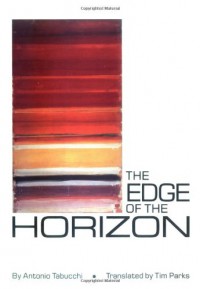Literaryness Made Easy: "The Edge of the Horizon" by Antonio Tabucchi, Tim Parks (Translator)

Of course it's the old "can you teach talent" argument, isn't it? That's the meaty question, the puzzler of substantial length and girth that needs to be grabbed firmly with both hands. What produces worse writing? People striking off alone, with nobody to tell them to stop and their critics being self-selected (because you see a lot of that online in fandom communities) or people going to study creative writing and, much like Larkin claims parents do, getting fucked up by their teachers' preferences? Books aren't quite the same as music, there's less chances for an obviously wrong note that doesn't fit; even a single poorly. Chosen word in a 50,000 word novel is often far less jarring in the grand scheme of things than a G# when you expect a G in a 10-minute concerto. As they say, even Homer nods. Of course if you open a book and it begins "It was the best of times, it was the best of times", then there's a problem. And "bad" is just a really broad term. A book might be beautifully written but completely morally repellant, and I'd call that bad; it might have a thrilling plot but contain nothing but dull clichés and poor imagery and I'd call it bad. I'd even call a book bad if it was great for three quarters of its length and then had an awful ending. All these different “badnesses” are forgivable by different people to different degrees; I'd be more kind to a book which just had a bit of a flat ending to a book that thoroughly endorsed objectivism as a moral philosophy as its sole Daseinszweck. I'd be more forgiving of something that used cliché and well-worn archetypes with brio and enthusiasm and a little inventiveness than something that tries so hard to not be formulaic it feels like a schoolchild told they can't use "got, nice or went".
If you're into "Literaryness", read on.
 4
4



